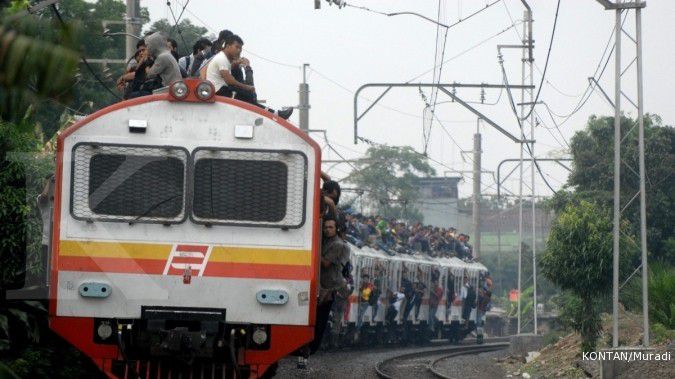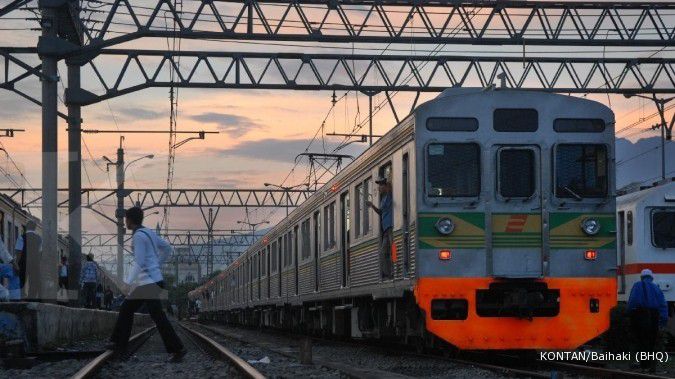JAKARTA. State-owned train operator PT KAI Commuter Jabodetabek (KCJ) has begun preparing stations across Greater Jakarta as part of its plan to eliminate paper tickets and fully implement an electronic ticketing system next year.The railway operator, long criticized for its substandard services, has been struggling to modernize its facilities, including phasing out the nondescript economy trains where passengers are forced to share space with beggars and buskers. KCJ spokeswoman Eva Chairunisa said the company was now working to equip all train stations with electronic gates that would only allow passengers with electronic ticket to enter the platforms. The new system was expected to begin operating in March, she said. The company initially planned to implement the system in July this year, but it failed to clear illegal vendors and beggars from the stations, which is necessary for the e-ticketing system to work. Since early this month, KCJ decided to involve members of the Indonesian Military (TNI) to help evict illegal vendors. “We have sent the vendors notification letters days before the eviction. We asked TNI to help prevent possible riots,” Eva saidThe train operator is optimistic that this time it will be able to implement the e-ticketing system by March. “We are very optimistic. We hope that there would be no constraints ahead of the system’s implementation,” Eva said.The company has ordered 160 electric train carriages, 100 of which will be delivered in 2013. The additional capacity is hoped to encourage people to take the train, the form of mass transportation on which thousands of daily commuters in Greater Jakarta rely.“As for now, there are approximately 450,000 commuters per day, a significant increase from 300,000 passengers in January this year,” Eva told The Jakarta Post. “We are expecting that the number will reach 1.2 million in 2018. Therefore we are trying to improve our service by implementing this electronic system in order to accommodate more passengers at the stations.” As the company strives to make improvements, the public has grown getting impatient current services, especially after fares were raised from Rp 6,000 (62 US cents) to Rp 8,000 in October. In November, the Association of Train Passengers (Aspeka) threatened to sue KCJ and state rail firm PT Kereta Api Indonesia (KAI) unless both operators were able to make significant improvements. The association urged the rail service providers to urgently address overcrowded station platforms, broken audio systems, a lack of facilities for the disabled, frequent delays and a worrying lack of safety equipment.KCJ previously launched a monthly commuter electronic ticketing (comet) system, but recently shelved the system after only a few months. “With the monthly ticketing system, passengers who didn’t travel using commuter trains a few days each month still had to pay for the journeys they didn’t make. The new system is fairer because commuters don’t have to pay if they don’t travel,” Eva said. A commuter, Abdurrahman Hakim, 23, was doubtful that the train operator could clean up the stations. “Some stations in the suburbs have a lot of access points and it will be hard to fully control the stations. Transjakarta once used [an e-ticket] system but somehow it didn’t work out and it went back using paper tickets,” Hakim said.He said that the train operator had a lot of other things that urgently needed to be fixed, including ensuring that all trains come on time and the air conditioners are working. The Jakarta Post
Commuter eticket will be fully implemented in 2013
JAKARTA. State-owned train operator PT KAI Commuter Jabodetabek (KCJ) has begun preparing stations across Greater Jakarta as part of its plan to eliminate paper tickets and fully implement an electronic ticketing system next year.The railway operator, long criticized for its substandard services, has been struggling to modernize its facilities, including phasing out the nondescript economy trains where passengers are forced to share space with beggars and buskers. KCJ spokeswoman Eva Chairunisa said the company was now working to equip all train stations with electronic gates that would only allow passengers with electronic ticket to enter the platforms. The new system was expected to begin operating in March, she said. The company initially planned to implement the system in July this year, but it failed to clear illegal vendors and beggars from the stations, which is necessary for the e-ticketing system to work. Since early this month, KCJ decided to involve members of the Indonesian Military (TNI) to help evict illegal vendors. “We have sent the vendors notification letters days before the eviction. We asked TNI to help prevent possible riots,” Eva saidThe train operator is optimistic that this time it will be able to implement the e-ticketing system by March. “We are very optimistic. We hope that there would be no constraints ahead of the system’s implementation,” Eva said.The company has ordered 160 electric train carriages, 100 of which will be delivered in 2013. The additional capacity is hoped to encourage people to take the train, the form of mass transportation on which thousands of daily commuters in Greater Jakarta rely.“As for now, there are approximately 450,000 commuters per day, a significant increase from 300,000 passengers in January this year,” Eva told The Jakarta Post. “We are expecting that the number will reach 1.2 million in 2018. Therefore we are trying to improve our service by implementing this electronic system in order to accommodate more passengers at the stations.” As the company strives to make improvements, the public has grown getting impatient current services, especially after fares were raised from Rp 6,000 (62 US cents) to Rp 8,000 in October. In November, the Association of Train Passengers (Aspeka) threatened to sue KCJ and state rail firm PT Kereta Api Indonesia (KAI) unless both operators were able to make significant improvements. The association urged the rail service providers to urgently address overcrowded station platforms, broken audio systems, a lack of facilities for the disabled, frequent delays and a worrying lack of safety equipment.KCJ previously launched a monthly commuter electronic ticketing (comet) system, but recently shelved the system after only a few months. “With the monthly ticketing system, passengers who didn’t travel using commuter trains a few days each month still had to pay for the journeys they didn’t make. The new system is fairer because commuters don’t have to pay if they don’t travel,” Eva said. A commuter, Abdurrahman Hakim, 23, was doubtful that the train operator could clean up the stations. “Some stations in the suburbs have a lot of access points and it will be hard to fully control the stations. Transjakarta once used [an e-ticket] system but somehow it didn’t work out and it went back using paper tickets,” Hakim said.He said that the train operator had a lot of other things that urgently needed to be fixed, including ensuring that all trains come on time and the air conditioners are working. The Jakarta Post




